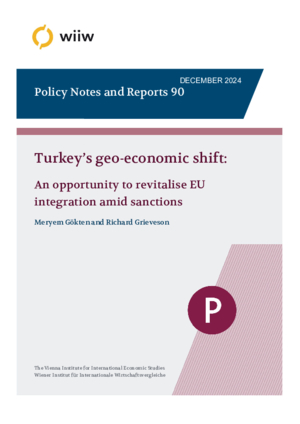Turkey’s geo-economic shift: An opportunity to revitalise EU integration amid sanctions
publication_icon
Meryem Gökten and Richard Grieveson
wiiw Policy Note/Policy Report No. 90, December 2024
18 pages including 4 Figures
- Since the beginning of the war in Ukraine, Turkey has adeptly navigated a balancing act between Russia and the West, leveraging its position as a credible mediator.
- However, Turkey’s geo-economic vulnerabilities and strong economic ties with the West have made this approach untenable, especially given the recent escalation in pressure from the United States.
- As the US adopts a firmer stance and Turkey starts to distance itself from Russia, the implications for the European Union’s strategy towards Turkey become increasingly important, presenting an opportunity to revitalise relationships.
- However, relations may sour again owing to stalled progress in relations and ongoing regional instability. Turkey's vocal stance against Israel and the war in Gaza underlines its dissatisfaction with US and EU responses, but at present the country has only limited leverage to effect change.
- The EU needs to adopt a proactive stance towards Turkey, moving beyond waiting for a post-Erdoğan era, and establish new forms of engagement other than EU accession.
- A modernisation of EU-Turkey customs rules is long overdue and would benefit both sides.
- Given Turkey’s geopolitical significance and NATO membership, it is crucial for the EU to maintain relations with the country to prevent it from aligning more closely with Moscow and Beijing.
Keywords: Turkey, EU, foreign trade, customs union, sanctions, investment
JEL classification: F14, F50, F51, O10, O53
Countries covered: European Union, Russia, Turkey, US
Research Areas: International Trade, Competitiveness and FDI
